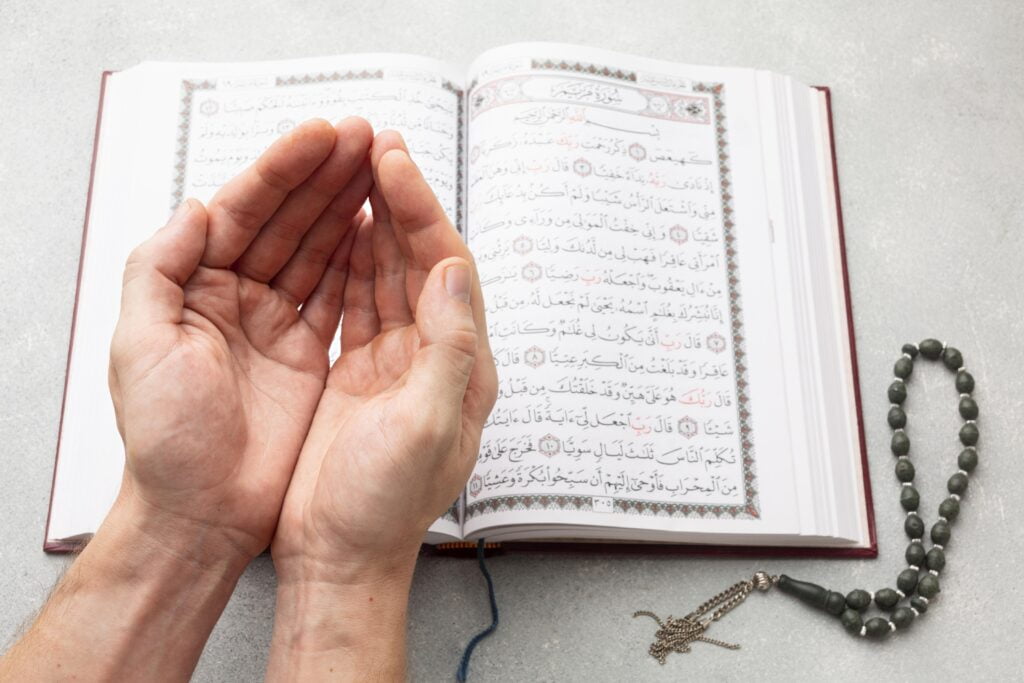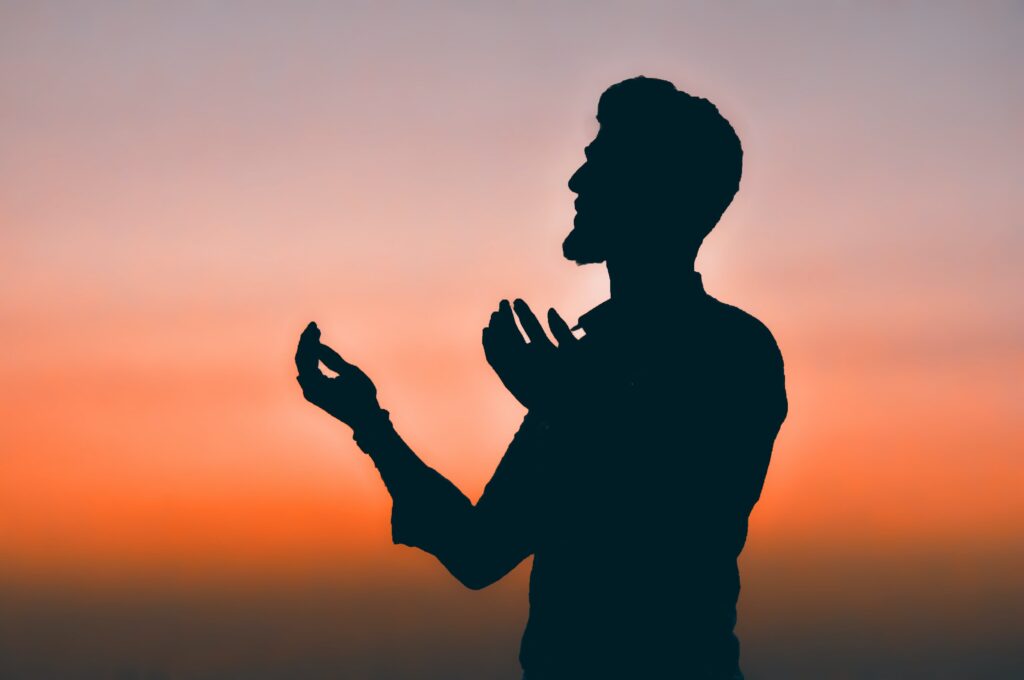I. Introduction:
A. The Power of Dua’s: A Gateway to Spiritual Connection
Dua in its Linguistic and Islamic Context:
(Which 12 Quranic Duas are These) The term “dua” linguistically signifies calling and raising one’s voice. In Islamic terminology, dua refers to supplication and seeking Allah’s presence, where individuals express their weaknesses and helplessness before Allah (SWT), seeking assistance. Drawing a parallel to everyday scenarios, just as a child calls out to their parents in times of trouble, humans, too, turn to the Almighty when faced with adversity.
Now arises the question: why is seeking dua essential? Let’s understand this through a simple analogy. In the worldly order, whenever someone encounters difficulty, they instinctively seek help from someone stronger or more capable. A child, when in trouble, calls out to their parents. Similarly, humans, when faced with challenges, turn to a higher power, realizing their own limitations.
May! These 12 Quranic Duas Help you.
Why Seek Help from Allah?
The straightforward answer lies in recognizing Allah’s unmatched attributes.When seeking assistance, we naturally seek certain qualities in the one we turn to—strength, capability, and the ability to resolve our issues. Allah, the Maker of the heavens and the earth, holds unparalleled strength and is fully equipped to deal with our challenges. Consequently, seeking help from Allah is a rational course of action.
In essence, dua is an acknowledgment of Allah’s (SWT) supreme attributes and a plea for His intervention. Unlike any created being, Allah is not only powerful but also merciful and generous. Seeking His help is an act of humility and trust in His boundless mercy.
In conclusion, dua is a means of expressing our dependence on Allah (SWT), recognizing His superior qualities, and seeking His assistance in times of need. It is a humble acknowledgment that, in the vastness of creation, Allah(SWT) is the most powerful, capable, and merciful, and turning to Him for help is a logical and deeply meaningful act.
What Quran Say About Dua?
1. Allah Encourages Dua:
“And your Lord says, ‘Call upon Me; I will respond to you.’ Indeed, those who disdain My worship will enter Hell [rendered] contemptible.” (Quran 40:60)
2. Allah’s Promise to Answer Dua:
“And when My servants ask you concerning Me, indeed, I am near. I respond to the invocation of the supplicant when he calls upon Me.” (Quran 2:186)
3. Dua in Times of Adversity:
“And Ayub (Job), when he called to his Lord, ‘Indeed, adversity has touched me, and you are the Most Merciful of the merciful.'” (Quran 21:83)
4.Dua for Patience:
“And be patient for the decision of your Lord, for indeed, you are in Our eyes.” (Quran 52:48)
Dua is repeatedly emphasized in the Quran as a powerful means of communication with Allah, encouraging believers to seek guidance, mercy, and assistance in various aspects of life. The references provided highlight the importance of dua as an integral part of worship and a channel through which believers connect with their Creator.
Importance Of Dua From Hadith:
Narrated Abu Huraira: The Messenger of Allah (ﷺ) said, “None of you should say: ‘O Allah, forgive me if You wish; O Allah, be merciful to me if You wish,’ but he should be firm in his request, for Allah cannot be compelled.” (Sahih Muslim 2679a)
Narrated Abu Huraira: The Messenger of Allah (ﷺ) said, “The supplication of every one of you is granted if he does not grow impatient and says: I supplicated but it was not granted.” (Sahih Muslim 2735a)
Narrated Anas: While the Prophet was delivering a sermon on a Friday, a man stood up and said, O Allah’s Apostle! Invoke Allah to bless us with rain. (The Prophet invoked Allah for rain.) So, the sky became overcast and it started raining till one could hardly reach one’s home. It kept on raining till the next Friday when the same man or another man got up and said (to the Prophet), Invoke Allah to withhold the rain from us, for we have been drowned (with heavy rain ). The Prophet said, O Allah! Let it rain around us and not on us. Then the clouds started dispersing around Medina and rain ceased to fall on the people of Medina.
Sahih Bukhari#6342
What Is The Importance Of Attahiyat / Tashahhud?
The narration goes: “Abdullah ibn Sakhr Abu Ma’mar reported: I heard Ibn Mas’ud saying, ‘The Messenger of Allah, peace and blessings be upon him, taught me the Tashahhud just as he would teach me a chapter from the Quran. He said,
( TRANSLITERATION)
“At-tahiyyatu lillahi wa as-salawatu wa at-tayyibat. As-salamu ‘alaika ayyuha an-nabiyyu wa rahmatullahi wa barakatuh. As-salamu ‘alayna wa ‘ala ‘ibadillahi as-salihin. Ashhadu an la ilaha illallah, wa ashhadu anna Muhammadan ‘abduhu wa rasuluh.”
(Attahiyat Full Dua In English/ Meaning Of Attahiyat)
‘The greetings, prayers, and good deeds are for Allah. Peace be upon you, O Prophet, and the mercy of Allah and His blessings. Peace be upon us and upon the righteous servants of Allah. I bear witness that there is no god but Allah, and I bear witness that Muhammad is His servant and messenger. He is between my arms.’ When the Prophet, peace and blessings be upon him, passed away, we said, ‘Peace be upon the Prophet.”” This narration emphasizes the meticulous instruction of the Tashahhud by the Prophet Muhammad, peace and blessings be upon him, to his companions.
The Tashahhud is a crucial component of the Muslim prayer (Salah) and is recited in the final sitting position of the prayer. It includes expressions of greetings, prayers, and testimony to the oneness of Allah and the prophethood of Muhammad. The Prophet’s meticulous teaching of this portion underscores its significance in the prayer ritual, serving as a moment of deep connection and acknowledgment of the fundamental tenets of Islamic faith.
How To Sit In Attahiyat / Tashahhud?
Narrated by Ibn Umar: “When the Messenger of Allah (ﷺ) sat during the Tashahhud, he would place his left hand on his left knee and his right hand on his right knee, and he formed a ring with the fingers, and pointed with the index finger.”
Explanation: This hadith describes the position of the Prophet Muhammad (ﷺ) during the Tashahhud, which is a crucial part of the Muslim prayer. In this position, the Prophet (ﷺ) placed his left hand on his left knee and his right hand on his right knee. The fingers were formed into a ring, and he pointed with the index finger, bearing witness to the oneness of Allah. This gesture symbolizes the declaration of the Shahada, the testimony of faith. The specific way the Prophet (ﷺ) positioned his hands and fingers during this part of the prayer serves as a practical example for Muslims to follow in their own prayers.
When Was Attahiyat Revealed:
In the context of greetings, there is no commonly found narration in the usual collections of Hadith. However, in some books of Tafsir (exegesis) and Sira (biography of the Prophet), it is mentioned that during the night journey of Isra and Mi’raj, when the Prophet Muhammad (peace be upon him) ascended to the heavens, he initiated the words of greeting with “At-Tahiyyatu lillahi wassalawatu wattayyibat,” expressing praise and glorification for Allah, as if presenting peace before Allah. In response, Allah, the Lord of Majesty, responded with the words “Assalamu Alaika Ayyuhan-Nabiyyu” (Peace be upon you, O Prophet),
and the Prophet replied, “Wa Alaikas-Salamu wa Rahmatullahi wa Barakatuhu” (And peace be upon you and the mercy of Allah and His blessings). Subsequently, Angel Gabriel (peace be upon him) added, “Ashhadu an la ilaha illallah, wa ashhadu anna Muhammadan ‘abduhu wa rasuluh” (I bear witness that there is no god but Allah, and I bear witness that Muhammad is His servant and Messenger). It is essential to note that this narration is not conveyed through an authentic chain of transmission.
This narrative, although not attested by a reliable chain, signifies the significance of greetings and praise during the Prophet’s miraculous night journey.
The authentic narration is the one in which Abdullah bin Masood (may Allah be pleased with him) states that the Messenger of Allah (ﷺ) taught us the Tashahhud in the same way he would teach us a Surah from the Noble Quran.
What To Say After Tashahhud?
After reciting the Tashahhud in the prayer, it is customary to say a supplication for the Prophet Muhammad (ﷺ). The common phrasing is:
“Allahumma salli ala Muhammadin wa ala aali Muhammadin kama sallaita ala Ibrahim wa ala aali Ibrahim, innaka Hamidun Majid. Allahumma barik ala Muhammadin wa ala aali Muhammadin kama barakta ala Ibrahim wa ala aali Ibrahim, innaka Hamidun Majid.”
Translation: “O Allah, bless Muhammad and the family of Muhammad, as You have blessed Ibrahim and his family. Surely, You are Praiseworthy, Glorious. O Allah, be gracious to Muhammad and the family of Muhammad, as You were gracious to Ibrahim and his family. Surely, You are Praiseworthy, Glorious.”
Dua’s That we can Recite After Tashahhud:
After Tashahhud, it is established from the practice of the Prophet Muhammad (ﷺ) that various supplications can be recited. Therefore, the consensus among scholars is that it is not obligatory to recite a specific supplication; rather, one can choose any supplication from the Quran, Sunnah, or established traditions.”
What Prophet (PBUH) Recite After Tashahhud?

The supplication after Tashahhud reported from Ibn Abbas, from the Prophet Muhammad (ﷺ), is as follows:
“Allahumma inni a’udhu bika min ‘adhabi jahannama, wa a’udhu bika min ‘adhabil qabri, wa a’udhu bika min fitnatid-dajjal, wa a’udhu bika min fitnatil-mahya wal-mamat.”
Transliteration: “Allahumma inni a’udhu bika min ‘adhabi jahannama, wa a’udhu bika min ‘adhabil qabri, wa a’udhu bika min fitnatid-dajjal, wa a’udhu bika min fitnatil-mahya wal-mamat.”
Translation: “O Allah, I seek refuge in You from the punishment of Hellfire, and I seek refuge in You from the punishment of the grave, and I seek refuge in You from the trial of the False Messiah (Dajjal), and I seek refuge in You from the trials of life and death.”
عَنْ أَبِي هُرَيْرَةَ، قَالَ: قَالَ رَسُولُ اللهِ صَلَّى اللهُ عَلَيْهِ وَسَلَّمَ: إِذَا تَشَهَّدَ أَحَدُكُمْ فَلْيَسْتَعِذْ بِاللهِ مِنْ أَرْبَعٍ يَقُولُ: اللهُمَّ إِنِّي أَعُوذُ بِكَ مِنْ عَذَابِ جَهَنَّمَ، وَمِنْ عَذَابِ الْقَبْرِ، وَمِنْ فِتْنَةِ الْمَحْيَا وَالْمَمَاتِ، وَمِنْ شَرِّ فِتْنَةِ الْمَسِيحِ الدَّجَّالِ
The hadith narrated by Abu Huraira states that the Prophet Muhammad (ﷺ) said: “When one of you finishes the Tashahhud, let him seek refuge in Allah from four things, saying: ‘Allahumma inni a’udhu bika min ‘adhabi jahannama, wa min ‘adhabil qabri, wa min fitnatil-mahya wal-mamat, wa min sharri fitnatil-masihid-dajjal.'”
Translation: “O Allah, I seek refuge in You from the punishment of Hellfire, and I seek refuge in You from the punishment of the grave, and I seek refuge in You from the trials of life and death, and I seek refuge in You from the evil trial of the False Messiah (Dajjal).”
عَنِ النَّبِيِّ صَلَّى اللَّهُ عَلَيْهِ وَسَلَّمَ : أَنَّهُ كَانَ يَأْمُرُ بِهِنَّ ، اللَّهُمَّ إِنِّي أَعُوذُ بِكَ مِنَ الْبُخْلِ ، وَأَعُوذُ بِكَ مِنَ الْجُبْنِ ، وَأَعُوذُ بِكَ أَنْ أُرَدَّ إِلَى أَرْذَلِ الْعُمُرِ ، وَأَعُوذُ بِكَ مِنْ فِتْنَةِ الدُّنْيَا يَعْنِي فِتْنَةَ الدَّجَّالِ ، وَأَعُوذُ بِكَ مِنْ عَذَابِ الْقَبْرِ .
The Prophet Muhammad (ﷺ) used to supplicate with the following words: “Allahumma inni a’udhu bika min al-bukhl, wa a’udhu bika min al-jubn, wa a’udhu bika an uradda ila arzalil-umur, wa a’udhu bika min fitnatid-dunya, ya’nī fitnatad-dajjal, wa a’udhu bika min ‘adhabil-qabr.”
Translation: “O Allah, I seek refuge in You from stinginess, I seek refuge in You from cowardice, I seek refuge in You from returning to the lowest of ages, and I seek refuge in You from the trials of the world, meaning the trial of the False Messiah (Dajjal), and I seek refuge in You from the punishment of the grave.”
Dua : Seeking Blessings for Religion and Worldly Affairs

Dua for Seeking Blessings in Both Worlds and Protection from the Punishment of Hell: “Rabbana atina fid-dunya hasanatan wa fil-akhirati hasanatan waqina ‘adhaban-nar.”
Translation: “Our Lord, give us in this world [that which is] good and in the Hereafter [that which is] good and protect us from the punishment of the Fire.” (Surah Al-Baqarah 2:201)
Explanation: This supplication is a profound request to Allah for goodness and blessings in both the worldly life and the Hereafter, as well as seeking protection from the torment of Hellfire. Allah, in His infinite mercy, has explicitly conveyed the virtue of this prayer in the Quran.
Dua for Seeking Mercy, Forgiveness, Ease, Success, and Victory over Enemies:

“La yukallifu Allahu nafsan illa wus’aha, laha ma kasabat wa ‘alayha ma iktasabat. Rabbana la tu’akhidhna in naseena aw akhtana. Rabbana wala tahmil ‘alayna isran kama hamaltahu ‘ala allatheena min qablina. Rabbana wala tuhammilna ma la taqata lana bih. Wa’fu ‘anna, waghfir lana, warhamna. Anta mawlana fansurna ‘ala al-qawm al-kafireen.”
Translation: “Allah does not burden a soul beyond that it can bear. It will have [the consequence of] what [good] it has gained, and it will bear [the consequence of] what [evil] it has earned. Our Lord, do not impose blame upon us if we forget or make a mistake. Our Lord, and lay not upon us a burden like that which You laid upon those before us. Our Lord, and burden us not with that which we have no ability to bear. And pardon us; and forgive us, and have mercy upon us. You are our protector, so give us victory over the disbelieving people.” (Surah Al-Baqarah 2:286)
Explanation: This supplication encompasses a beautiful expression of humility, acknowledging human limitations, seeking mercy, forgiveness, and protection from burdens beyond capacity. It serves as a comprehensive plea for Allah’s compassion, guidance, and victory over adversaries, both in this world and the Hereafter
Dua for Steadfastness and Mercy:

“Rabbana la tuzigh quloobana ba’da idh hadaytana wahab lana min ladunka rahmah, innaka antal Wahhab. Rabbana innaka jami’u al-nasi li-yawmin la rayba feeh, innallaha la yukhliful mi’aad.”
Translation: “Our Lord, do not let our hearts deviate after You have guided us, and grant us mercy from Your presence. Surely, You are the Bestower. Our Lord, surely You will gather mankind for a Day about which there is no doubt. Indeed, Allah does not fail in His promise.”
Explanation: This dua is a plea for steadfastness on the right path and seeks Allah’s mercy. It acknowledges human vulnerability and implores Allah to keep our hearts firm in guidance. The phrase “innaka antal Wahhab” emphasizes Allah’s attribute of being the Bestower, indicating His limitless generosity. The dua also expresses belief in the Day of Judgment and invokes Allah’s promise of gathering humanity on that Day. It is a comprehensive supplication, asking for guidance, mercy, and success in the Hereafter.
Dua for a Good Ending (Khawatim Bilkhair):

“Fatir-as-samawati wal-ard, Anta Waliyyi fi’d-dunya wal-akhirah, Tawaffani Musliman, wa alhikni bissaliheen.”
Translation: “Originator of the heavens and the earth, You are my Protector in this world and the Hereafter. Cause me to die as a Muslim and join me with the righteous.”
Explanation: This supplication is the concluding prayer of Prophet Yusuf (Joseph), and it expresses a deep desire for a good ending. The believer seeks Allah’s protection, guidance, and mercy throughout life and requests a peaceful and righteous departure from this world. The supplicant acknowledges Allah’s role as the Creator and Protector and entrusts their destiny to His wisdom and mercy. The essence of this prayer is a plea for a dignified and faithful conclusion to one’s life journey.
Dua for Blessings and Forgiveness for Parents and Fellow Muslims:

“Rabbi, ij’alni muqeema as-salati wa min dhurriyyati. Rabbana wa taqabbal dua’. Rabbana, ighfir li wa liwali-dayya wa lil-mu’mineena yawma yaqumu al-hisab.”
Translation: “My Lord, make me an establisher of prayer, and also my descendants. Our Lord, accept my supplication. Our Lord, forgive me and my parents and the believers the day the account is established.”
Explanation: This dua is attributed to Prophet Ibrahim (Abraham) and is a comprehensive prayer seeking Allah’s guidance, forgiveness, and mercy. The supplicant asks for the ability to establish regular prayers and requests Allah’s acceptance of their prayers. Additionally, the individual seeks forgiveness for themselves, their parents, and all the believers on the Day of Judgment. This supplication reflects the humility and concern for the well-being of one’s family and the entire community of believers.
A comprehensive prayer for the well-being in both worlds:

A comprehensive prayer for the well-being in both worlds that Prophet Muhammad (peace be upon him) recited on various occasions and can also be recited after prayers:
“Allahumma aslih li deeni allathee huwa ismatu amri, wa aslih li dunyaya allati feeha maashi, wa aslih li akhirati allati feeha maadi, waj’alil-hayata ziyadatan li fee kulli khair, waj’alil-mawta rahatan li min kulli shar.”
Translation: “O Allah, rectify my religion, which is the safeguard of my affairs, and rectify my worldly life where I earn my living, and rectify my Hereafter where I have to return. Make my life an increase in all that is good and make death a comfort and protection from all that is evil.”
Explanation: This dua seeks Allah’s guidance and blessings in various aspects of life, asking for improvement in one’s religion, worldly affairs, and the Hereafter. It expresses the desire for a life that brings an increase in goodness and a peaceful death protected from all harm. This supplication reflects a holistic approach, addressing both the spiritual and worldly aspects of an individual’s life.
A supplication for steadfastness in religion, obtaining piety, and safeguarding oneself from the neediness of creation:

“Allahumma inni as’aluka al-huda, wat-tuqaa, wal-`afaafa, wal-ghina.”
Translation: “O Allah, I ask You for guidance, piety, chastity, and self-sufficiency.”
Explanation: This dua seeks Allah’s guidance for the right path, the attainment of piety, protection from immoral behaviors, and self-sufficiency to avoid being dependent on others. It reflects the believer’s desire for a righteous and self-sufficient life, coupled with moral integrity and closeness to Allah.
Dua for health, well-being, good morals, trustworthiness, and contentment with destiny:

“Allahumma inni as’aluka as-sihhata wal-`iffah, wal-amanata wa husnal khuluq, wal-riza bil-qadar.”
Translation: “O Allah, I ask You for health, chastity, trustworthiness, good morals, and contentment with destiny.”
Explanation: This dua seeks Allah’s blessings for physical health, moral integrity, trustworthiness, good character, and contentment with whatever fate Allah has decreed. It reflects the believer’s desire for a holistic well-being that encompasses both physical and moral dimensions, along with a sense of trust and contentment with Allah’s divine plan.
Dua for the rectification of both the apparent and hidden aspects, and seeking righteous family, children, and blessed wealth:

“Allahumma ij’al sirrati khayran min ‘alaniyati, wa ij’al ‘alaniyati salihatan. Allahumma inni as’aluka min salihima tutiya an-nas min al-mali wal-ahli wal-waladi ghayri ad-dalli wa la mudill.”
Translation: “O Allah, make my inward better than my outward, and make my outward righteous. O Allah, I ask You for the goodness that You bestow upon people in terms of wealth, family, and children, without leading astray or causing others to go astray.”
Explanation: This supplication seeks Allah’s assistance in making one’s inner character better than their outward appearance, and it asks for righteous wealth, family, and children without causing harm or being led astray. It reflects a desire for holistic goodness, encompassing both the apparent and hidden aspects of a person’s life.
Dua for the protection of oneself and one’s faith, seeking protection from enemies and enviers, and asking for good while seeking refuge from evil:

“Allahumma ihfazni bil-Islami qaiman, wa ihfazni bil-Islami qa’idan, wa ihfazni bil-Islami raqidan, wa la tushmit biyya ‘aduwwan hasidan. Allahumma inni as’aluka min kulli khayrin khazainuhu biyadika wa a’udhu bika min kulli sharrin khazainuhu biyadika.”
Translation: “O Allah, protect me with Islam while standing, protect me with Islam while sitting, protect me with Islam while lying down, and do not let any enemy or envier find joy in any harm against me. O Allah, I ask You for every good that You have in Your hands, and I seek refuge in You from every evil that You have in Your hands.”
Explanation: This supplication seeks Allah’s protection in various states—whether standing, sitting, or lying down—through the shield of Islam. It asks for safeguarding from enemies and enviers and implores Allah for every good that is under His control while seeking refuge from every evil that may come from Him.
Dua for being seen as great in the eyes of people is:

The supplication for considering oneself small in one’s own eyes and great in the eyes of others is:
“Allahumma ij’alni shakooran, waj’alni sabooran, waj’alni fee ‘ayni sagheeran, wa fee a’yunin-nasi kabeeran.”
Translation: “O Allah, make me grateful, make me patient, make me appear small in my eyes, and appear great in the eyes of the people.”
Explanation: This prayer seeks qualities of gratitude and patience from Allah. It also asks to be perceived as humble and small in one’s own view while being seen as significant and great in the eyes of others. It reflects a desire for humility and a positive reputation among people.
To see our courses click the link






Hello my family member! I wish to say that this post is amazing, great written and include almost all important
infos. I would like to look extra posts like this .
Jazak Allah , Shukran
Pingback: 11 Powerful Masnoon Duas After Salah for Fulflling Life